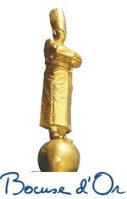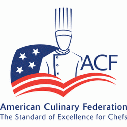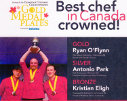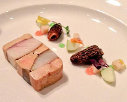Restaurants & Restaurant Critics
|
22nd Edition
New Year's 2014
|
In local neighborhoods customer approval along with the accompanying word of mouth recommendations remain the tried and true indicators that establish the reputation of a restaurant or a dining room. This reputation is earned or lost. Success is beckoning or closure is at hand.
In metropolitan centers the same remains true, however, other extraneous factors come into play. Food is without question an obsessive preoccupation for the media, certainly television, but equally so the print media.
Can these publications ever create a feeding frenzy over ratings and rankings? We have a bottled water company from Lombardy - S. Pellegrino declaring a manifest of the Worlds 50 Best Restaurants. There is the Zagat Survey that spawned the Zagat Buzz. Is your hotel a Relais & Chateaux or has it garnered the Relais Gourmands Trophy? This is status.
The AAA Diamonds with their ascending categories bestow instant credibility and recognition. What can we say about the esteemed Michelin Guide, which for decades has served up many crowns and thereby anointed kings of the kitchen or by denial has lowered crowns of thorns upon once proud heads? Famed Chef Raymond Blanc who holds two stars does not revere Michelin and its systems neither is he shy to say so. He holds no fear of crowns or thorns. He is the consummate Master. However, where is that 3rd star?
Also we must pay attention to the new kids on the block in the electronic media such as Serious Eats.com or Eater.com. The raves of these popular food blogs have massive readership and build online consensus.
There are dozens of competing magazines, newspapers and food newsletters. Standing tall among this scrimmage of reviewers are a few whose reputations are near mythic as restaurant critics. Let us hold these names and profiles for another time and place.
Drama seems to be a component of the relationships between Chefs and Critics. Sadly, many of us will recall the death of Bernard Loiseau who committed suicide in 2003. Bernard feared that his beloved name sake restaurant might lose one of its Michelin Stars. After this tragedy, rumors and accusations flew like arrows. The blame for Bernard’s moment of madness was direct at Michelin & Gault Millault and at the influential food critic of Le Figaro. Blame was never substantiated.. Michelin denied its intention of taking a star away and Loiseau’s restaurant kept its valued star.
France takes its chefs and restaurant critics very seriously. The rumor mill is a fully-fledged industry; it is the spicy appetizer that sets up a restaurant for the benediction of high accolades or the slow but certain merciless process of crucifixion. This as the critic sees fitting. He is the sole arbiter.
Let us move on to recent shenanigans and look at the love that bonds the Irish Chef with a food critic from that Emerald Island.
Once upon a time in a far off island there is an Irish Chef named Oliver Dunne and a food critic named Lucinda O’Sullivan. Oliver and his partner Rory own a Restaurant in Dublin named Cleaver East. They also hold a Michelin Star for another restaurant in Country Dublin named Bon Appetite . Lucinda is the food critic for the Sunday Independent newspaper.
Lucinda did not enjoy her dinner and like all stalwart critics, she sat down and wrote a damming review under the headline of ‘Chop Chop’ in the newspapers ‘Life Magazine’. Holy macaroons was Dunne ever upset. He responded with feeling. He called Lucinda by some terrible names on his Twitter page; the only one that I can reprint here is “she is arrogant”. He also stated that it was “unbelievable that she would question his abilities”. What nerve the woman has!
The dispute escalated. Dunne and his partner posted an image on Twitter. Each partner held a cleaver in one hand and between them they grasped the critics head which had been cut off at the neck.
The Irish Food Guide dubbed this row “LucindaGate” The Food Guide wondered what impact this image may have on future relations between Irish Chefs and restaurant reviewers. Go figure!
Let us elevate the tone somewhat and talk about Gordon Ramsay and Michelin’s proclamations for New York and America. Gordon lost his 2 Michelin Stars at The London NYC and closed the restaurant. He still owns many fine dining establishments and will not hurt for long.
New York holds five two-star restaurants. I recollect that there are seven three-star restaurants in America. While reading up for this editorial I picked up what I believe to be a pivotal raison d’être that anchors Michelin’s philosophy.
In an interview with Bloomberg’s Ryan Sutton, Michael Ellis, the General Manager of guides commented on Gordon’s The London NYC: “We’ve had issues with consistency, and consistency is a huge thing for us.”
This rang a bell. I thought back to a BBC feature named “The Madness of Perfection”. In this one-hour long feature, author and food critics William Sitwell visited the Michelin headquarters in Paris and chatted with the Guides Director. The conversation naturally turned to the Bernard Loiseau tragic death. Arising out of this overview came forth reasons why stars are awarded and taken away. There in Paris the story was exactly as Michael Ellis proclaimed in New York to Ryan Sutton: Consistency. If you crave a Michelin star, you have to be perfect 24/7. That is consistency. That’s the monkey on your back.
Beware! Fear not the Michelin Inspector. Keep a sharp lookout for the person in the sunglasses. The Express newspaper recently ran a piece with this header: “Restaurants worst enemy: Trip advisor becomes one of the most feared UK food critics. A Jet-Setting businessman who travels the world has become one of the UK’s most feared food critics after being named the most prolific Trip Advisor reviewer”.
This man’s name is Phil Blackett and he is a travelling salesperson. The product he sells is sun glasses.
The newspaper reports that Phil describes himself as a frank and honest man. He has contributed 780 restaurant and hotel reviews and he will even share with us his thoughts on takeaway meals. His hometown is Newcastle and he has nearly completed 200 reviews of his City. Now there is little doubt that Newcastle has more than its fair share of fine dining establishments but 200 hundred diners worthy of our scribes time? Somewhat obsessive compulsive one might say; after all, he is constantly busy also reporting from 501 cities across 36 countries.
“I have given some of the top restaurants zero stars and the scruffiest of kebab shops high acclaim. I’m not fussy, I just have my standards”, he says. That’s my boy Phil– you tell them, call it like it is: nothing quite like a little North Country straight talk. What about those shades Phil? Do they stay on or come off during supper. Talking about super do you have that at teatime or is teatime really suppertime? I never could understand the difference.
Rarely these days will I turn on the TV to watch a programme on the Food Chanel. I’m tired of the tom foolery of the supposedly up and coming young chefs and I cringe when listening to the supercilious programme anchors. I am not in the least bit ashamed to state that I recall with enthusiasm the anticipation of preparing to relax and watch Julia Child. God, could she wield a cleaver and separate two joints in a flick of her wrist. Then there was Graham Kerr known as the Galloping Gourmet. His brash attitude was infectious.
Personalities such as Julia & Graham were precursors leading to the rise of the celebrity chef. Trends in food change and chefs are always pushing the envelope with new concepts. The restaurant critic grasps the apron strings of these chefs and rides in their wake. Always a follower.
Food as art. Dining as entertainment. In the top kitchens this is where the trend is at. Restaurant critics must understand their position. They are a constituent part of the Restaurant industry, as are our butchers, bakers, and fishmongers. These all form the framework of the industry in which we operate. Each city has its ‘foodies’. The critic is a valuable messenger carrying news and updates and recommendations along with cautions. Like the wholesale suppliers he must strive to ensure that his product or reviews are not contaminated by uncalled for flippancy.
One comment has stuck in my memory since starting to write this piece:
After her husband’s death a writer asked about the importance of Michelin Stars. Madame Loiseau commented ‘firstly our business is to sell happiness to our customers then we can collect stars’.
How fitting…
Maurice O'Flynn, Editor.
Archived Editorials
September 2013
May 2013
January 2013
September 2012
May 2012
January 2012
September 2011
May 2011
January 2011
October 2010
June 2010
February 2010
January 2010
July 2009
September 2009
July 2009
June 2009
December 2008
September 2008
Summer 2008
February 2008
|














